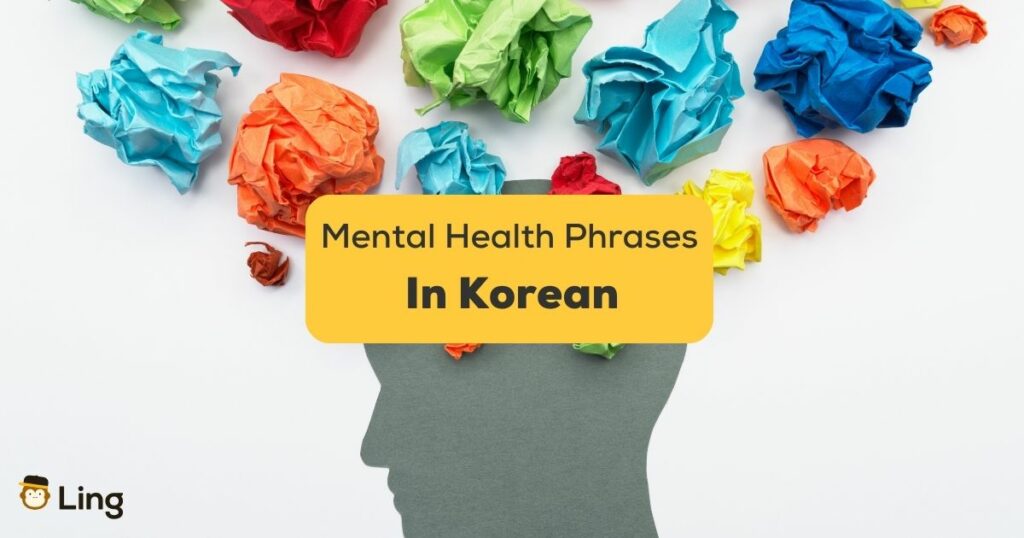Ahoy, K-drama lovers! Tried watching one without subtitles? It’s akin to, well, imagine using floaties in the deep end of a pool; you’re floating, but the real thrill’s missing. Life’s a bit like that, isn’t it? Sometimes you’re cruising, sometimes drowning in feels. But the magic sauce? Knowledge. Just as adding a few Korean phrases spices up drama nights, knowing Korean phrases for mental health can level up our emotional lives. Ready to delve into the nitty-gritty of Korean heart-to-hearts or merely crave some juicy K-drama gossip (got ya, didn’t I?)? Hold tight, ’cause we’re diving deep!
So, there’s been a lot of talk about mental health globally. From the dude making your coffee to those Hollywood stars, everyone’s chatting about it. But some places, like Korea, they’ve got this old-school way of thinking. Been to Seoul? It’s all about respect, harmony, and keeping up appearances. In the past, talking mental health was like airing dirty laundry. But guess what? Times are changing! Korea’s now joining the mental health chat, and it’s about time. Wanna chat up your Korean buddy about feelings? Stick around and you’ll get all the deets.
Mental Health In Korean Culture
Back in the day, while Korea was busy modernizing, mental health was kinda left in the dust. But winds of change? They’re blowing! You might hear “마음의 평화” (Ma-eum-ui Pyeonghwa) which means “peace of mind” in casual talks now. And K-dramas? Those emotional scenes? They aren’t just fiction anymore. Asking someone “괜찮아요?” (Gwaenchanhayo?), or “You good?”, is now less about being polite and more about real concern.
As Korea navigates its mental health landscape, it’s shaping a beautiful amalgamation of tradition and modern values. It’s about striking a balance between outward success and inner peace. It’s the bravery to express “스트레스 받아 (Seuteureseu bada)” or “I’m stressed,” knowing a supportive community surrounds you.

Korean Phrases For Mental Health
Language, a mirror to culture, and the Korean vernacular offer a fascinating look into how they perceive and deal with mental health. Time for a deep dive!
Pep Talk Phrases
Imagine comforting words as the warmth you feel when wrapping yourself in a cozy blanket on a chilly night. Korean words do that, with an added touch of historical richness.
- 괜찮아 (Gwaenchanha): Means “It’s all good.” You know, when everything’s going sideways, we just need to hear that it’ll be okay. This is Korea’s way of saying, “Chill, things will work out.”
- 힘내 (Himnae): Basically “Hang in there” or “You got this!” Life’s nuts sometimes, and this is like a mini pep rally in a word.
- 무슨 일이야? (Museun iriya?): “What’s up?” But it’s more than just asking. It’s like, “Hey, I’m here, spill.”
When You’re Not Feeling 100%
Ever felt the weight of the world’s expectations? Korean has crafted words for those very moments.
- 마음이 아파 (Ma-eumi apa): “My heart’s heavy.” You know those moments when things just hurt? This is how you say it.
- 스트레스 받아 (Seuteureseu bada): “I’m stressed out.” Life’s fast, and sometimes you just gotta admit you’re overwhelmed.
- 나는 외로워 (Naneun oerowo): “I’m feeling alone.” Loneliness sucks, and this is how you tell someone you’re feeling it.
Got Your Back Phrases
Support. It’s the backbone of any relationship. Korean phrases emphasize the nation’s focus on unity.
- 곁에 있을게 (Gyeote isseulge): “I’m right here.” It’s like saying, “Don’t worry, I’ve got your back.”
- 언제든지 얘기해 (Eonjedeunji yaegihae): “Hit me up anytime.” It’s all about letting someone know you’re all ears.
- 너를 위해 여기 있어 (Neoreul wihae yeogi isseo): “I’m here for ya.” It’s less of a phrase and more of a hug in words.

Korean Words Related To Mental Health
Let’s venture into the kaleidoscope of Korean sentiments, shall we? Here’s an illuminating discourse into some enthralling words that carry the weight of a culture.
마음 (Ma-eum)
Eschew your pedestrian comprehension of “heart” or “mind.” Delve into the intricate depths of the Korean psyche, where it transcends mere cardiac rhythms or neural activities. Ma-eum stands as the chalice of sentiments, ethos, and concealed cogitations – a veritable echo of one’s ethereal imprint.
스트레스 (Seuteureseu)
On cursory reflection, it resonates with “stress.” Yet, ruminating deeper reveals how Korea’s rich societal mosaic might shade and shape this strain in nuanced spectrums alien to a cursory gaze.
평화 (Pyeonghwa)
An eloquent utterance signifying “peace.” Whether a lofty global aspiration or the serene sanctum of an individual’s spirit, within Korea’s relentless metropolitan cadence, chasing Pyeonghwa parallels the quest for the celestial pole.
기쁨 (Gippeum)
Beyond fleeting gaiety lies a “joy” profound and enduring. Envision it as an exuberant jubilation birthed from triumphs, affection, or those epiphanies of mundane yet impactful daily euphoria.
슬픔 (Seulpeum)
An intricate counterpoint to joy’s resonance. This lexicon crafts the tapestry of “sorrow.” Immerse yourself in a tear-jerking scene of a K-drama to glimpse Seulpeum in its visceral magnanimity.
우울 (Uul)
Navigating the labyrinth of “depression” demands recognizing the evolving dialogues on mental well-being within South Korea. To fathom Uul is a stride towards a domain of compassion and cognizance.
힐링 (Hilling)
Derivative of “healing,” its implication transcends mere recuperation. It’s the odyssey towards rebirth, be it the emotional sanctuary post upheaval or the ephemeral solace midst existence’s perpetual whirlwinds.
감정 (Gamjeong)
Transcending a mere “emotion,” it’s an expedition. Gamjeong encapsulates the zeniths, nadirs, interludes, and the complex mosaic of human fervor. Bear in mind, within the Korean spirit, sentiments aren’t isolated reverberations. They harmonize in a concert graced by intimately intertwined souls.
Learn Korean With Ling
This World Mental Health Day, remember, words have the power to heal. Fancy sprinkling some Korean flair in your life? Grab the Ling app from the App Store or Play Store, and perhaps, just maybe, you’ll find keys to unlock not only a new language but also your emotional well-being.
Stay whimsical, keep those connections alive, and above all, be unabashedly you!


































































